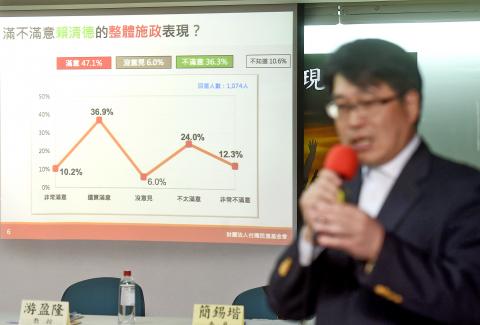President Tsai Ing-wen’s (蔡英文) approval rating dropped 4.2 percentage points from last month to 31.7 percent, her second-lowest in a Taiwanese Public Opinion Foundation poll so far, indicating that her Democratic Progressive Party (DPP) administration has lost a large number of supporters, the foundation said yesterday.
The poll found that approval for Tsai was only slightly higher than her rating of 29.8 percent in August last year, while her disapproval rating rose by 0.1 percentage points from last month to 46.7 percent.
Disapproval of Tsai exceeded 50 percent among respondents aged between 25 and 54, and her approval rating was less than 30 percent among that group, foundation chairman You Ying-lung (游盈隆) said.

Photo: Chien Jung-fong, Taipei Times
“It signals a dangerous implication when young and middle-aged groups become Tsai’s main opponents,” You said.
However, 47.1 percent of respondents approved of Premier William Lai’s (賴清德) performance, while 36.3 percent were dissatisfied.
The foundation said 59.9 percent of respondents were not satisfied with Tsai’s economic performance and only 30.6 were satisfied, a new low for her in the foundation’s polls.
Although most economic indicators have shown signs of progress since last year, 41.5 percent of the respondents still believed that the economy took a downturn last year, 13.1 percent said it was picking up and 39.6 percent said there was not much difference from previous years, You said.
While 30.6 percent of respondents said they expected the economy to slow this year, 24.4 percent said they expected it to improve and 33.1 percent said it would not change.
Asked about their personal financial situation last year, 62.2 percent of respondents said it had not changed, 13 percent said it had improved and 23 percent said they were worse off.
As for other issues, while 39.8 percent of respondents supported the Civil Aeronautics Administration’s decision to hold off approving applications for additional Lunar New Year holiday flights by China Eastern Airlines Corp (中國東方航空) and by XiamenAir (廈門航空) to counter Beijing’s unilateral activation of the northbound M503 flight route, 43.8 percent opposed the decision.
Asked about Tsai’s handling of cross-strait relations, 59.6 percent of respondents said they were dissatisfied, while 30.8 percent were satisfied.
The president’s approach to Beijing was too hardline according to 23.3 percent of the respondents, while 30.3 percent said it was appropriate and 29.8 percent said it was too weak.
The survey results show that the public is disappointed with the economy, and the DPP should outline a broader vision of economic development and cross-strait relations, former DPP legislator Chien Hsi-chieh (簡錫堦) said.
Of the respondents, 28 percent said they identified with the DPP and 24 percent with the Chinese Nationalist Party (KMT), while 43.4 percent said they were neutral.
The percentage of people identifying with the DPP was as high as 51.9 percent in June 2016, but the latest poll showed it had fallen to its second-lowest point since Tsai took office.
The survey was conducted between Sunday and Tuesday last week. A total of 1,074 valid samples were collected and the poll has a margin of error of 2.99 percentage points.

Conflict with Taiwan could leave China with “massive economic disruption, catastrophic military losses, significant social unrest, and devastating sanctions,” a US think tank said in a report released on Monday. The German Marshall Fund released a report titled If China Attacks Taiwan: The Consequences for China of “Minor Conflict” and “Major War” Scenarios. The report details the “massive” economic, military, social and international costs to China in the event of a minor conflict or major war with Taiwan, estimating that the Chinese People’s Liberation Army (PLA) could sustain losses of more than half of its active-duty ground forces, including 100,000 troops. Understanding Chinese

The Ministry of Foreign Affairs (MOFA) yesterday said it is closely monitoring developments in Venezuela, and would continue to cooperate with democratic allies and work together for regional and global security, stability, and prosperity. The remarks came after the US on Saturday launched a series of airstrikes in Venezuela and kidnapped Venezuelan President Nicolas Maduro, who was later flown to New York along with his wife. The pair face US charges related to drug trafficking and alleged cooperation with gangs designated as terrorist organizations. Maduro has denied the allegations. The ministry said that it is closely monitoring the political and economic situation

UNRELENTING: China attempted cyberattacks on Taiwan’s critical infrastructure 2.63 million times per day last year, up from 1.23 million in 2023, the NSB said China’s cyberarmy has long engaged in cyberattacks against Taiwan’s critical infrastructure, employing diverse and evolving tactics, the National Security Bureau (NSB) said yesterday, adding that cyberattacks on critical energy infrastructure last year increased 10-fold compared with the previous year. The NSB yesterday released a report titled Analysis on China’s Cyber Threats to Taiwan’s Critical Infrastructure in 2025, outlining the number of cyberattacks, major tactics and hacker groups. Taiwan’s national intelligence community identified a large number of cybersecurity incidents last year, the bureau said in a statement. China’s cyberarmy last year launched an average of 2.63 million intrusion attempts per day targeting Taiwan’s critical

AGING: As of last month, people aged 65 or older accounted for 20.06 percent of the total population and the number of couples who got married fell by 18,685 from 2024 Taiwan has surpassed South Korea as the country least willing to have children, with an annual crude birthrate of 4.62 per 1,000 people, Ministry of the Interior data showed yesterday. The nation was previously ranked the second-lowest country in terms of total fertility rate, or the average number of children a woman has in her lifetime. However, South Korea’s fertility rate began to recover from 2023, with total fertility rate rising from 0.72 and estimated to reach 0.82 to 0.85 by last year, and the crude birthrate projected at 6.7 per 1,000 people. Japan’s crude birthrate was projected to fall below six,